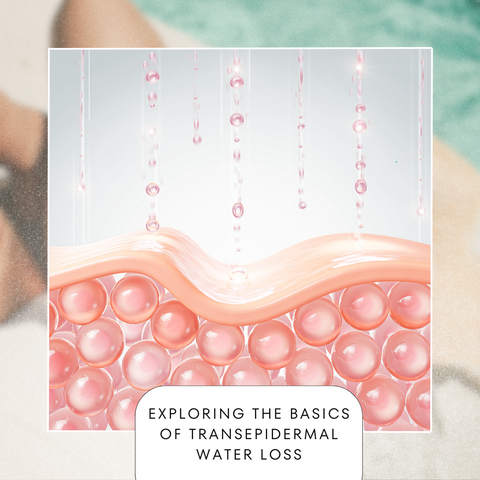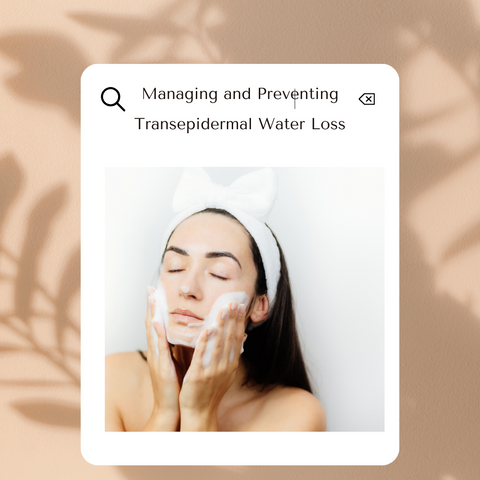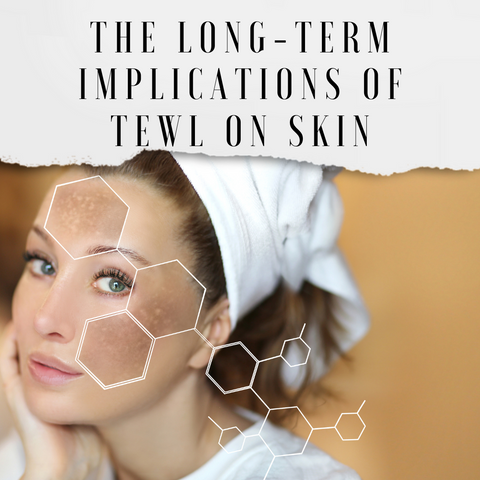Exploring the Basics of Transepidermal Water Loss

Transepidermal Water Loss (TEWL) is an important concept in dermatology and skincare, referring to the process by which water travels from the body to the external environment via the epidermis, the skin's outermost layer. Understanding TEWL is critical for maintaining skin health and treating different skin disorders. In this blog, we will look at a few important points to learn more about Transepidermal Water Loss.
Understanding TEWL and Its Role in Skin Health
Transepidermal Water Loss (TEWL) is an important dermatological measure that plays an important role in skin health. The skin acts as a protective barrier between the body's internal environment and the outside world. The amount of water that evaporates from the skin's surface is measured by TEWL, which reflects the barrier's integrity. Here's a more in-depth look at TEWL and its role in skin health, including skin barrier function, moisture management, factors influencing TEWL, TEWL measurement, skincare implications, clinical applications, preventing TEWL, and age-related changes.
Factors Contributing to Increased TEWL
Transepidermal Water Loss (TEWL) can be caused by a variety of reasons, and recognising these components is critical for addressing and preventing skin problems associated with excessive TEWL. Environmental circumstances, skin problems, age-related changes, harsh skincare products, over-exfoliation, frequent hot baths or showers, medications, and UV radiation are all typical contributors to increased TEWL. Maintaining a balanced skincare routine, protecting the skin from harsh environmental conditions, and treating underlying skin issues are all important for preventing excessive water loss and promoting overall skin health.
The Relationship Between TEWL and Skin Barrier Function
The connection between Transepidermal Water Loss (TEWL) and skin barrier function is complex. The skin barrier, which is largely found in the stratum corneum (the epidermis's outermost layer), acts as a protective shield against external influences, infections, and water loss. Understanding the relationship between TEWL and skin barrier function is critical for assessing skin health. Here's a quick rundown:
-
Intact Skin Barrier: A healthy and undamaged skin barrier is essential for good skin function. Corneocytes (dead skin cells) and lipids (fats) are organised in a matrix in the stratum corneum. This structure forms a barrier that protects against external irritants and prevents excessive water loss from the body.
-
TEWL as a Measure of Skin Barrier Function: The water evaporating from the skin's surface into the environment is quantified as TEWL. TEWL is typically low in healthy skin, indicating that the skin barrier retains moisture well. A high TEWL, on the other hand, indicates a compromised or fragile epidermal barrier.
-
Disruption of the Skin Barrier: Several causes can compromise the skin barrier's integrity. Environmental factors, skin diseases, harsh skincare practises, and ageing are all included. TEWL increases when the skin barrier is damaged because water evaporates more quickly from the skin.
-
Impact of Skin Conditions on TEWL: Eczema, psoriasis, and atopic dermatitis are all symptoms of a faulty skin barrier. Because the skin's ability to retain water is hindered in certain conditions, the baseline TEWL may be higher. The underlying skin problem must be treated in order to restore the barrier function and reduce TEWL.
-
Moisturization and TEWL: Moisturisers are essential for maintaining the skin's barrier. They contain humectants (which attract and retain water), emollients (which soften and smooth the skin), and occlusives (which form a protective layer). Moisturisers that are properly designed help minimise TEWL by enhancing skin moisture and maintaining the barrier.
-
Age-Related Changes: The production of lipids and oils in the skin naturally declines as people age. This loss in skin lipids with ageing might impair the skin barrier, resulting in increased TEWL. To address age-related changes, adequate skincare, including the use of moisturisers, becomes especially necessary.
-
Protective Function Against Irritants and Allergens: A healthy skin barrier protects against environmental irritants and allergens. The risk of irritation and allergic responses increases when the barrier is damaged. The skin barrier must be restored in order to reduce sensitivity and maintain general skin health.
Managing and Preventing Transepidermal Water Loss

Transepidermal Water Loss (TEWL) management and prevention are critical for keeping healthy, moisturised skin. Use gentle cleansers, limit bathing time and water temperature, choose moisturising products, apply moisturiser after bathing, occlusive agents, humectants, avoid overexfoliation, protective clothing, use a humidifier, and sun protection, address underlying skin conditions, stay hydrated, and consider professional treatments to help manage and prevent excessive TEWL. It's crucial to remember that everyone's skin type and condition is different, so what works for one person may not work for another. If you have recurring concerns regarding TEWL or skin health, you should get personalised advice and treatment suggestions from a dermatologist.
Effective Strategies for Reducing TEWL
Reducing Transepidermal Water Loss (TEWL) is critical for keeping skin healthy and hydrated. Here are some helpful ways for reducing TEWL and promoting a robust, functional skin barrier:
-
Use a Gentle Cleanser: Choose a gentle, moisturising cleanser that does not remove the skin's natural oils. Harsh soaps and cleansers with powerful detergents should be avoided since they can disturb the lipid barrier.
-
Moisturize Regularly: Apply a moisturizer with hydrating ingredients, such as hyaluronic acid, glycerin, and ceramides. Moisturizers help lock in moisture, reduce TEWL, and strengthen the skin barrier.
-
Occlusive Agents: Use a moisturiser that contains moisturising ingredients such as hyaluronic acid, glycerin, and ceramides. Moisturisers help with moisture retention, TEWL decrease, and skin barrier strengthening.
-
Humectants: Incorporate products containing humectants, such as hyaluronic acid, into your skincare routine. Humectants attract water to the skin, helping to maintain hydration and reduce TEWL.
-
Apply Moisturizer on Damp Skin: For maximum effectiveness, apply moisturizer to slightly damp skin, such as right after a shower. This helps trap moisture on the skin surface.
-
Use Emollients: Emollients like fatty acids, oils, and squalane help soften and smooth the skin. They contribute to the restoration of the skin barrier, reducing TEWL.
-
Avoid Overexfoliation: Limit the use of harsh exfoliants, as they can compromise the stratum corneum and increase TEWL. Gentle exfoliation, performed at an appropriate frequency, helps maintain a healthy skin barrier.
-
Protective Clothing: In extreme weather conditions, wear protective clothing to shield the skin from harsh elements like wind and cold air. This helps minimize water loss and maintain skin hydration.
-
Humidifier Use: Use a humidifier in dry indoor environments to add moisture to the air. This is especially useful during the winter, when indoor heating systems can contribute to dry air.
-
Sun Protection: Use an SPF-rated sunscreen to shield your skin from UV rays. Sun damage can weaken the skin's barrier, resulting in increased TEWL and premature ageing.
-
Address Underlying Skin Conditions: If you have skin conditions such as eczema or psoriasis, work with a dermatologist to manage and treat these conditions effectively. Treating the underlying cause can improve the skin barrier and reduce TEWL.
-
Stay Hydrated: Maintain internal hydration by drinking sufficient water. Well-hydrated skin is less prone to TEWL and feels more supple.
-
Choose Fragrance-Free Products: Fragrances can irritate the skin and aggravate TEWL. If you have sensitive skin, look for fragrance-free or hypoallergenic products.
-
Consider Professional Treatments: A dermatologist may recommend professional treatments such as laser therapy or prescription medications to address specific skin concerns and improve the skin barrier in some cases.
Choosing the Right Skincare Products to Combat TEWL
It is critical to choose the correct skincare products to counteract Transepidermal Water Loss (TEWL) and maintain a healthy skin barrier. When selecting products to address TEWL, look for hydrating cleansers, moisturisers with humectants, emollients, and occlusive agents, ceramides, niacinamide (vitamin B3), natural oils, fragrance-free formulations, gentle exfoliants, sunscreen, patch testing, and consultation with a dermatologist. Keep in mind that everyone's skin is different, so it may take some trial and error to find the items that work best for you. Furthermore, gradually introducing new products might help you evaluate your skin's response and avoid unwanted discomfort.
Lifestyle Adjustments to Minimize TEWL
Certain lifestyle changes can significantly help to reduce Transepidermal Water Loss (TEWL) and maintain a healthy skin barrier. The following are some lifestyle changes that can help reduce TEWL:
-
Stay Hydrated: Internal hydration is essential for good skin health. Drink plenty of water throughout the day to maintain overall hydration, which reflects on the skin.
-
Humidify Your Environment: Use a humidifier, especially if the environment is dry or air-conditioned. Increasing the humidity in the air can aid in preventing excessive water loss from the skin.
-
Prolonged hot baths or showers should be avoided: Long, hot baths or showers can deplete the skin's natural oils, contributing to TEWL. Reduce water loss by taking shorter, lukewarm baths or showers.
-
Protect Your Skin in Extreme Weather: Wear protective clothing to protect your skin in inclement weather, such as windy and chilly conditions. This lessens the chance of TEWL and helps prevent windburn.
-
Use Sun Protection: Use sunscreen with a broad-spectrum SPF to shield your skin from UV rays. Increased TEWL may result from sun damage that weakens the skin's protective layer.
-
Choose Moisture-Retaining Fabrics: Wear clothing made from breathable, moisture-wicking fabrics to help retain hydration. Avoid materials that may irritate the skin or contribute to water loss.
-
Avoid Smoking: Smoking has a negative impact on the skin, including compromising the skin barrier. Smoking cessation can improve overall skin health and lower TEWL.
-
Balanced Diet: Consume a diet high in vitamins, antioxidants, and essential fatty acids. These nutrients help to maintain skin health and can help to build a stronger skin barrier.
-
Manage Stress: Chronic stress can have an effect on the skin's barrier function. To promote overall well-being, use stress-reduction techniques such as meditation, yoga, or deep breathing exercises.
-
Regular Exercise: Regular physical activity increases circulation, which can benefit skin health. However, to avoid irritation, be sure to cleanse your skin after sweating.
-
Adequate Sleep: Lack of sleep can negatively impact skin hydration and barrier function. Aim for 7-9 hours of quality sleep each night to support overall skin health.
-
Gentle Skincare Practices: Be gentle when cleansing and drying your skin. Use mild cleansers, pat your skin dry instead of rubbing, and avoid aggressive exfoliation, which can disrupt the skin barrier.
-
Avoid Harsh Products: Choose skincare and household products that are gentle and free from harsh chemicals. Harsh cleansers and ingredients can strip the skin of its natural oils, contributing to TEWL.
-
Regular Dermatological Check-ups: Schedule regular visits to a dermatologist for skin check-ups. They can provide professional guidance on skincare practices and recommend treatments or adjustments based on your skin's needs.
The Long-Term Implications of TEWL on Skin

Transepidermal Water Loss (TEWL) is an important metric that reflects the skin barrier's health. Prolonged or chronic TEWL can have a number of long-term effects on the skin, potentially contributing to a variety of skin problems. Here are some of the long-term consequences of high TEWL:
-
Dry Skin: Chronic dryness can result from persistent TEWL, making the skin feel rough and tight. The skin's constant loss of water can cause a lack of hydration, impacting its general texture and look.
-
Dehydration: Chronic TEWL causes dehydration not just on the skin's surface but also in deeper layers. Skin that is dehydrated is more prone to fine lines and wrinkles.
-
Impaired Barrier Function: Elevated TEWL is frequently related to a weakened skin barrier. A weaker barrier allows irritants, allergens, and bacteria to more easily permeate the skin, resulting in increased sensitivity, inflammation, and potential skin problems.
-
Increased Sensitivity: A weakened skin barrier as a result of prolonged TEWL might cause increased sensitivity. Environmental factors, skincare products, and other potential irritants may cause the skin to become more reactive.
-
Accelerated Aging: Moisture loss from the skin can contribute to accelerated ageing. Dehydrated skin is more prone to the formation of fine lines, wrinkles, and elasticity loss.
-
Skin Disorders: Eczema, psoriasis, and atopic dermatitis are frequently associated with increased TEWL. Chronic TEWL can aggravate many disorders, causing chronic symptoms and flare-ups.
-
Inflammation: Prolonged TEWL can cause chronic skin irritation. Inflammatory activities can further compromise the skin barrier, contributing to an increase in the water loss cycle.
-
Compromised Healing: A weakened skin barrier as a result of prolonged TEWL may impair the skin's ability to heal properly. Scarring can occur when wounds, cuts, or injuries take longer to heal.
-
Hyperpigmentation: Chronic skin dryness and irritation can also contribute to hyperpigmentation. Uneven skin tones and black patches may become more visible as time passes.
-
Increased Susceptibility to Environmental Damage: A weaker barrier makes the skin more vulnerable to environmental harm, especially UV radiation. This can hasten the ageing process and increase the likelihood of solar damage.
-
Impact on Overall Skin Health: The long-term consequences of TEWL go beyond the look of the skin. Chronic water loss can have an effect on the skin's overall health, perhaps impairing its capacity to operate as an effective barrier against external stimuli.
It's vital to remember that TEWL's long-term consequences can be influenced by a variety of factors, including genetics, overall skin health, environmental conditions, and skincare practises. To counteract these impacts, it's critical to maintain a regular skincare routine that prioritises hydration, protection, and skin barrier integrity. If you have chronic problems or skin disorders, it is best to consult a dermatologist for tailored advice and treatment.
TEWL and Its Impact on Aging Skin
Transepidermal Water Loss (TEWL) contributes significantly to skin ageing. Changes in the structure and function of the skin occur as it ages, resulting in increased TEWL and contributing to the overall ageing appearance. Reduced skin barrier function, loss of natural moisturising factors, the decline in sebum production, thinning of the epidermis, loss of collagen and elastin, impact of UV radiation, increased sensitivity, impaired skin healing, promotion of fine lines and wrinkles, and role of inflammation are some of the ways TEWL affects ageing skin. This could include using moisturisers containing hyaluronic acid, ceramides, and antioxidants. Sun protection is also necessary to avoid further UV radiation damage. Consultation with a dermatologist can provide personalised recommendations for managing ageing skin and addressing specific TEWL concerns.
Addressing TEWL in Sensitive and Dry Skin Types
Transepidermal Water Loss (TEWL) is especially important for those with sensitive or dry skin because these skin diseases are frequently associated with a weakened skin barrier and increased water loss. To restore and maintain the skin barrier, treat TEWL in sensitive and dry skin with a gentle and moisturising skincare routine. It is important to be patient and consistent with your skincare programme because results may take time. If discomfort persists or worsens, consult a dermatologist for a more personalised and focused strategy for treating sensitive and dry skin while minimising TEWL.
Innovative Treatments and Technologies in Managing TEWL
Innovative therapies and technologies have been developed in recent years to address Transepidermal Water Loss (TEWL) and improve skin barrier function. These developments aim to give effective remedies for TEWL-related issues such as dryness, irritation, and a damaged skin barrier. Here are some examples of cutting-edge therapies and technology in this field:
-
Microneedling: Microneedling is the process of creating microchannels in the skin with fine, sterilised needles. This procedure increases collagen formation and improves the absorption of active substances, such as those aimed at increasing hydration and lowering TEWL.
-
Electroporation: Electroporation, also known as electropermeabilization, is a technique that uses electrical pulses to temporarily increase the permeability of the cell membrane. This approach can help moisturising and barrier-repairing chemicals penetrate deeper into the skin.
-
Microcurrent Technology: Microcurrent devices activate facial muscles and improve skin tone by using low-level electrical currents. Some devices also include technology to improve the absorption of skincare products, potentially assisting in the treatment of TEWL.
-
LED Therapy: Light-emitting diode (LED) therapy stimulates cellular activity by using different wavelengths of light. According to certain research, LED therapy can boost collagen formation and improve skin barrier function, potentially lowering TEWL.
-
Topical Growth Factors: Growth factors are proteins that help cells grow, mend, and maintain themselves. Growth factor-containing topical therapies attempt to boost the skin's natural repair processes and barrier performance.
-
Topical Ceramides: Ceramides are lipid molecules found naturally in the skin that are essential for maintaining the skin barrier. Ceramide-containing topical treatments help replace and strengthen the lipid barrier, minimising TEWL.
-
Hydrating Masks with Advanced Formulations: Hyaluronic acid, peptides, and other moisture-retaining substances are now included in innovative sheet masks and moisturising patches. These masks can provide an intense treatment to boost hydration and decrease TEWL.
-
Biometric Monitoring Devices: Some instruments, such as TEWL, are developed to monitor skin parameters. These devices can provide real-time data on skin hydration levels, allowing users to adapt their skincare routines as needed.
-
Personalized Skincare Technology: Technological advancements and artificial intelligence have aided in the development of personalised skincare apps and devices. These tools assess individual skin conditions and make tailored recommendations to address specific issues, such as TEWL.
-
Water-Infused Cosmetics: Some cosmetic formulas now feature water-infused technologies that claim to offer skin with long-term hydration. These solutions are intended to alleviate TEWL while also maintaining appropriate skin hydration.
-
Nanotechnology in Skincare: Nanotechnology is the use of nano-sized particles to transport active chemicals into the skin more efficiently. Nanotechnology is used in several skincare products to improve the penetration of moisturising and barrier-repairing ingredients.
-
Bioengineering and 3D Printing for Skin Tissue Repair: Researchers in the field of bioengineering are experimenting with 3D printing technology to build skin-like materials for tissue repair. These technologies have the potential to restore damaged skin barriers and reduce TEWL.
While these technologies show promise, their efficacy may vary, and more research is needed to determine their long-term advantages and safety. Before adding any new treatments or technologies to your skincare routine, seek personalised advice and assistance from a dermatologist or skincare professional.
Beyond the Surface: A Holistic Approach to TEWL

A comprehensive strategy for treating Transepidermal Water Loss (TEWL) takes into account variables other than the skin's surface. This comprehensive viewpoint considers a variety of lifestyle, overall health, and environmental elements that can affect skin moisture and barrier function. Here's a comprehensive method for TEWL management:
-
Nutrition and Hydration: Maintain a healthy diet that is high in vitamins, minerals, and necessary fatty acids. Internal hydration is critical for skin health. Foods high in water content, such as fruits and vegetables, can help with overall hydration.
-
Omega-3 Fatty Acids: Include omega-3 fatty acid-rich foods like fatty fish, flaxseeds, and walnuts in your diet. These fatty acids promote skin health and may aid in the reduction of inflammation, resulting in a healthier skin barrier.
-
Stress Management: Chronic stress can have a negative impact on skin health and contribute to higher TEWL. To increase general well-being, engage in stress-relieving activities such as meditation, yoga, or mindfulness.
-
Sleep Quality: Getting enough and good quality sleep is important for skin healing and regeneration. Sleep deprivation can lead to dehydration and decreased skin barrier function.
-
Physical Activity: Regular exercise increases circulation, which is beneficial to skin health. To avoid irritation, follow proper skincare practises, such as washing after sweating.
-
Environmental Factors: Be aware of environmental conditions that can have an impact on TEWL, such as extreme temperatures, wind, and low humidity. Make necessary changes to your skincare routine and protective measures.
-
Avoid Irritants: Choose skincare and household products that are free of harsh chemicals and potential irritants. Fragrance-free and hypoallergenic products can be gentler on the skin, particularly for those with sensitive skin.
-
Humidity Control: Use a humidifier to add moisture to the air in dry indoor environments. This can help prevent excessive water loss from the skin and keep it hydrated.
-
Mindful Skincare Practises: When cleansing and caring for your skin, be gentle. Avoid harsh exfoliation and excessive use of skincare products, as these can degrade the skin barrier and contribute to TEWL.
-
Holistic Skincare Products: Look for skincare products that address hydration, barrier repair, and overall skin health. Look for formulations that combine moisturising, soothing, and barrier-strengthening ingredients.
-
Professional Advice: For personalised advice, consult with a dermatologist or skincare professional. They can evaluate your skin type, concerns, and lifestyle factors to recommend a holistic skincare routine that is tailored to your specific needs.
-
Mind-Body Connection: Recognise the mind-body connection and how emotional well-being can affect skin health. Practises that promote relaxation and a positive mindset can help to improve overall skin health.
-
Avoid Excessive Caffeine and Alcohol Consumption: Excessive caffeine and alcohol consumption can contribute to dehydration. These substances, when consumed in moderation, can improve overall hydration and skin health.
-
Regular Dermatological Check-ups: Make regular appointments with a dermatologist for skin checks. Regular monitoring and early intervention can assist in addressing potential TEWL issues.
Taking a holistic approach to TEWL entails incorporating numerous lifestyle aspects, skincare practises, and overall well-being into a comprehensive skin health strategy. Individuals can attempt to maintain a robust and durable skin barrier by noting the linked nature of these factors.
Integrating Nutrition and Hydration in TEWL Prevention
Integrating correct nutrition and hydration into your daily routine is critical for preventing TEWL and keeping a healthy skin barrier. Stay hydrated, incorporate water-rich foods, omega-3 fatty acids, vitamins and antioxidants, collagen-rich foods, protein sources, healthy fats, hydrating herbal teas, limit processed and sugary foods, probiotics, moderate alcohol and caffeine intake, and a balanced diet are some dietary and hydration tips to support skin health and prevent excessive water loss. If you have special dietary concerns or limits, seek personalised guidance from a trained dietitian or healthcare expert. Furthermore, combining good diet with a consistent skincare programme and other lifestyle practises can help to prevent TEWL.
Environmental Influences on TEWL and Skincare
Transepidermal Water Loss (TEWL) and general skin health are influenced by environmental conditions. Understanding and dealing with these effects is essential for building a successful skincare routine. Humidity levels, temperature extremes, UV radiation, wind and environmental pollutants, indoor heating and air conditioning, hard water, seasonal fluctuations, clothes and materials, occupational exposures, and personal behaviours are all important environmental elements that might affect TEWL and skincare. You may design a skincare routine that promotes a healthy barrier function and minimises TEWL by knowing and adjusting to the environmental elements affecting your skin. If you have specific concerns or skin issues, a dermatologist can provide tailored advice.
Expert Insights: Dermatologist’s Tips on Controlling TEWL
Dermatologists are skincare professionals who can evaluate your skin type, problems, and medical history to make personalised recommendations. In this blog, we examined some dermatologists' expert ideas and methods for managing Transepidermal Water Loss (TEWL). Remember that these are basic guidelines, and that individual reactions to skincare practises may differ. If you have specific concerns about TEWL or other skin disorders, you should see a dermatologist for a comprehensive evaluation and tailored suggestions.
















